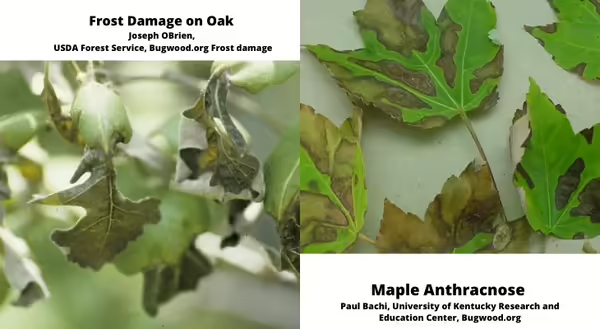
Some trees may be showing damage from the late frost much of Illinois had in May for several months to come as well as diseases that pop up during the rainy, cool spring weather. Watering during the hot dry months of summer will help these trees back to being a beautiful specimen.
Frost stress in trees
Large dark black sections are showing up on oak and other tree leaves in the backyards across Illinois. The frost hit at a vulnerable time when leaves were just beginning to emerge, rupturing the cells in the leaves. Although not the appealing spring green foliage we are used to with oak trees, the trees will suffer little in the long term.
Maples, redbuds, crabapple, flowering cherry, ginkgo, and magnolia trees may also have experienced some damage, showing up as:
- Shriveled or brown leaves, leaves with black spots with yellowing foliage or leaves that may have already dropped off the plants. These frost-damaged trees will produce new leaves if damaged leaves fall off.
- Branches that died or are slow to leaf out. You may remove dead branches from your trees, but first, be sure they are dead by doing a bark scratch test. A live tree will be green underneath the bark.
Rainy, cool spring tree diseases
Other leaf symptoms may appear as the season progresses. These are due to diseases that thrive in the rainy cool weather of spring. Disease symptoms can be hard to distinguish and may need to be sent to the University of Illinois Plant Clinic to get proper identification.
Many instances of anthracnose (on oak, maple, and sycamore trees), and cedar apple rust are two diseases already being reported at the Mclean County Master Gardeners help desk.
Tree diseases can be prevented, not cured
When these disease symptoms show up there is not much homeowners can do besides address a stressful growing environment. If homeowners don’t address issues causing tree stress, reduction of disease symptoms may be impossible.
Diseases are more prolific in stressed trees, and most of the stress comes from nutritional deficiencies, drought, improperly planted trees, improperly mulched plants.
- Diane Plewa, University of Illinois Plant Clinic Diagnostician
Tips for watering stressed-out trees during a drought
- Check and track the rain accumulation in your area on the Illinois State Climatologist website.
- Most established trees need 1" of water a week and 2" during hot, dry periods.
- Newly planted trees or shrubs require more frequent watering than established trees. They should be watered daily the first few weeks after planting and at least weekly for the first season of establishment.
- Wait until mid-summer or fall to fertilize established trees that experienced a stressful event in order to build up their reserves.
Photos: Frost damage on Oak Joseph OBrien, USDA Forest Service, Bugwood.org; Maple Anthracnose Paul Bachi, University of Kentucky Research and Education Center, Bugwood.org
ABOUT THE AUTHOR: Kelly Allsup is a Horticulture Educator for University of Illinois Extension serving Livingston, McLean and Woodford Counties. She meets the educational needs of her community, including local chapters of Master Gardener and Master Naturalist volunteers, through expertise in home horticulture and entomology. Her passion for ecologically-friendly gardening and all things plants makes her a dynamic speaker on topics that range from beneficial insects, growing vegetables and fruits, to urban trees.